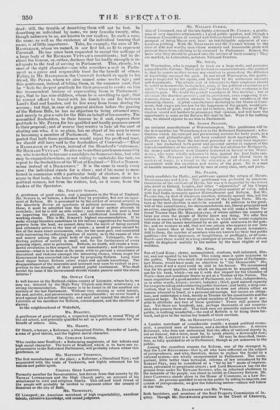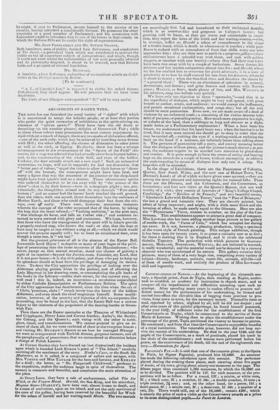MR. KING, Son of Lord KING; clever, accomplished, studious, well-informed,
liberal, and not spoiled by his birth. This young man is quite unknown to i
the public. Those who think that notoriety s a requisite of Parliamentary fitness, would have made no objection to "the Honourable" Mr. KING, even if not a word could be said in his favour. We recommend him for his good qualities, with which we happen to be acquainted, and not for his rank, which—we say it with due respect for the Chamber of Peers—does not constitute fitness to act as a Trustee of the Nation. The main requisites of a good member of Parliament, are—first, independence, or in other words, leisure ; second, industry; third, good natural capacity for comprehending and conducting public business ; and lastly, a deep conviction, that in being sent to Parliament he does not obtain either an honour whereof to boast, or a personal advantage, but incurs an obligation, and undertakes a task, merely as Trustee for his constituents and the nation at large. To how many actual members of Parliament is it possible to attribute any two of these qualities? Fewer still possess the last. Yet there are hundreds, nay, perhaps thousands of our countrymen who possess them all. That such men are generally unknown to the public, is nothing wonderful,— the end of Reform is to bring them forward, and give to the nation the benefit of their services.
MR. DE HOCHEPJED LARPENT, A London merchant of considerable wealth ; a sound political economist, a practical man of business, and a decided Reformer. A sincere Reformer, who does not understand that the office of national deputy is, not an honour, but a trust, must be, -to speak plainly, a downright fool; whereas Mr. LARPENT is a sound thinker. He may be described, therefore, as fully qualified to sit in Parliament, though as yet unknown to the public. Among the countless reasons for Reform, one of the strongest is, that the LAW REFORMERS—that is, all who have reflected on the subject of jurisprudence, and who, therefore, desire to replace the feudal by a rational system—are wholly unrepresented in Parliament. The unimportant, little better than technical, reforms of law introduced by Sir ROBERT PEEL, may be considered as a "bit by bit" mode of improvement, calculated to perpetuate abuses ; and Lord BROUGHAM has cut the ground from under Sir EDWARD Sounail, who, in reluctant obedience to the demands of the people, was about to nibble at Chancery Reform. Mr. Rung CAMPBELL stands alone in the House of Commons, as a Law Reformer. As persons qualified to serve the public by aiding to improve our system of jurisprudence, we give the following names—others will follow in due time.
MR. DUCKWORTH AND MR. TYRREL,
Both barristers, and members of the Real Property Commission of Inquiry. Though Mr. DUCKWORTH practises in the Court of Chancery,
he might, if sent to Parliament, devote himself to the service of his country, having inherited a considerable fortune. He possesses the other requisites of a good member of Parliament; and his connexion with Lancashire ought to introduce him to one of the towns in that county on -which the Reform Bills are to confer the right of representation.
MR. JOHN FONBLANQUE AND M. SUTTON SHARPE,
Both barristers, men of ability, decided Law Reformers, and conductors of The Jurist,—a periodical work which was established to instruct the public on the all-important subject of jurisprudence, and which, though it could not exist whilst the technicalities of law were generally admired anti its philosophy despised, is about to ba revived, now that Reform holds out a prospect of rational legislation.
MR. Mani VALE,
A barrister, a Law Reformer, and author of an excellent article on Codification in the Foreign Quarterly Review.
(To be continued.)



























 Previous page
Previous page